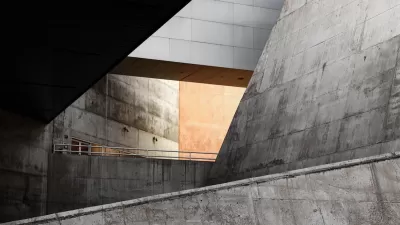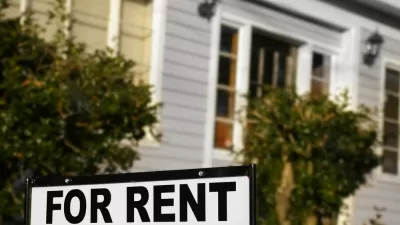The FBI may get the new building it's been clamoring for, and developers may get a prime opportunity on D.C.'s most prestigious avenue, if a recent proposal by the GSA comes to pass. But what will happen to one of the city's last Brutalist buildings?
We heard recently that D.C.'s preservation community was turning a cold shoulder to the plight of one of the city's last examples of Brutalist architecture. The proposal made public this week by the General Services Administration to "[hand] the Hoover building to private developers in exchange for building the FBI a new headquarters campus elsewhere in the region" is raising urgent questions about the fate of the "ugliest building on Earth" and a race among local officials to land the new FBI campus.
The announcement of the proposed trade by GSA Acting Administrator Dan Tangherlini on Monday, "immediately kick-started a competition among local jurisdictions to win a federal campus that would bring as many as 11,000 FBI headquarters jobs," writes Jonathan O'Connell. "Local members of Congress sounded like real estate brokers as they pitched sites and talked up their jurisdictions."
"While the FBI voiced its displeasure about the [Hoover] building in recent years, a snazzy new downtown neighborhood grew up around it, one featuring retailers H&M, Anthropologie and shops selling frozen yogurt and gourmet sandwiches."
"The apartments and restaurants make the concrete mass of the government building appear more dated than ever. Its sidewalks, devoid of cafes and patrolled by FBI authorities on Segways, seems to belong to a time when downtown D.C. emptied at 5 p.m. Even top historic preservation officials in the city consider the building not worth what would probably be a very public, bitter fight to try to save it," adds O'Connell.
Officials hope the sale of the building will pay for the cost of constructing a new FBI campus.
FULL STORY: GSA proposes trading Hoover building for new FBI campus

Alabama: Trump Terminates Settlements for Black Communities Harmed By Raw Sewage
Trump deemed the landmark civil rights agreement “illegal DEI and environmental justice policy.”

Study: Maui’s Plan to Convert Vacation Rentals to Long-Term Housing Could Cause Nearly $1 Billion Economic Loss
The plan would reduce visitor accommodation by 25% resulting in 1,900 jobs lost.

Planetizen Federal Action Tracker
A weekly monitor of how Trump’s orders and actions are impacting planners and planning in America.

Wind Energy on the Rise Despite Federal Policy Reversal
The Trump administration is revoking federal support for renewable energy, but demand for new projects continues unabated.

Passengers Flock to Caltrain After Electrification
The new electric trains are running faster and more reliably, leading to strong ridership growth on the Bay Area rail system.

Texas Churches Rally Behind ‘Yes in God’s Back Yard’ Legislation
Religious leaders want the state to reduce zoning regulations to streamline leasing church-owned land to housing developers.
Urban Design for Planners 1: Software Tools
This six-course series explores essential urban design concepts using open source software and equips planners with the tools they need to participate fully in the urban design process.
Planning for Universal Design
Learn the tools for implementing Universal Design in planning regulations.
Caltrans
Smith Gee Studio
Institute for Housing and Urban Development Studies (IHS)
City of Grandview
Harvard GSD Executive Education
Toledo-Lucas County Plan Commissions
Salt Lake City
NYU Wagner Graduate School of Public Service




























